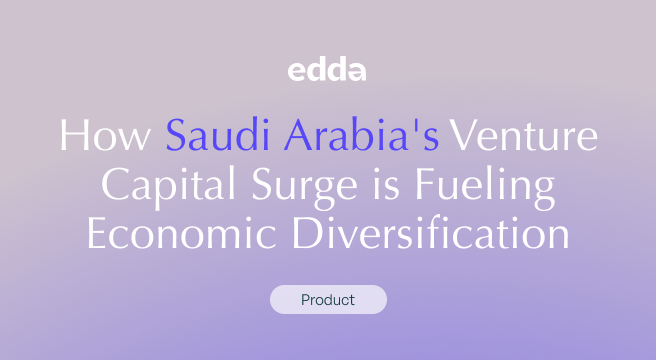Amidst a backdrop of a slowing venture capital market and the pressure of persistently higher interest rates, one sector that stands out for its resilience is the energy sector.
This sector, especially within innovative energy solutions, continues to draw significant investment attention, setting it apart in a time of cautious investor sentiment.
This article aims to unravel the dynamics shaping this investment trend, offering venture capitalists insights into the enduring appeal of the energy sector, despite broader market headwinds. As we explore these investment patterns, we’ll uncover the strategic opportunities that lie within, guiding you in navigating these changing tides with informed precision.
In addition, find out why investors rely on Edda, the best CRM for venture capital and private equity deal flow software, to streamline their VC deal flow.
The Resilience of Energy Sector Investments
Despite an overall cautious approach by venture capitalists due to economic uncertainties and higher interest rates, energy startups are securing substantial financial injections. This resilience is a testament to the sector’s robustness and highlights the growing recognition of its critical role in future economies.
The sustained investment interest in the energy sector can be attributed to several factors. Firstly, the global push towards sustainable and renewable energy sources, driven by environmental concerns and policy incentives, has created a fertile ground for innovation and investment.
Secondly, the technological advancements in energy storage, distribution, and generation have opened up new avenues for startups to disrupt traditional energy markets, making them attractive investment targets.
For venture capitalists, this resilience offers opportunity. In a landscape where safe harbors are increasingly rare, energy sector investments promise returns while aligning with a broader societal shift towards sustainability. Engaging with this sector allows investors to be at the forefront of the energy transition, supporting technologies and business models that could define the next generation of energy infrastructure.
The Shift in Mega-Round Dynamics
Nonetheless, the energy sector is not immune to broader economic forces. A McKinsey report highlights the turbulent times and disruptions faced by energy companies, including significant volatility in commodity prices and supply chain disruptions. This context is crucial for understanding the reduction in “mega-rounds” and the necessity for a more strategic investment approach.
For instance, the report points to a notable instance of price volatility, where in early 2021, power prices in Texas surged from approximately $1,000 per megawatt-hour (MWh) to $9,000 per MWh due to a polar vortex.
Such extreme fluctuations reflect the inherent risks in the energy market, influencing the investment strategies of venture capitalists. In an environment characterized by such unpredictability, the wisdom of diversifying investment across a portfolio of smaller, strategically chosen deals becomes evident.
The shift away from mega-rounds does not signify a reduction in opportunities but rather a call for more adaptive investment strategies in the face of changing market conditions.
Geographic Diversification in Energy Investments
A compelling trend emerging in the energy sector is the geographic diversification of investments. While China has historically been a dominant force, particularly in solar and battery technologies, recent patterns indicate a broadening of the investment landscape.
The United States and the European Union are becoming focal points for energy sector investments, driven by significant policy initiatives such as the U.S.’s Inflation Reduction Act and the EU’s Green Deal. These policies intend to boost domestic energy innovation and infrastructure, making these regions attractive to venture capitalists.
The U.S. and EU, with their robust policy frameworks, are fostering ecosystems ripe for energy innovation, from advanced battery technologies to alternative energy sources like geothermal and tidal energy. These regions offer venture capitalists a dual advantage: access to cutting-edge energy innovations and a regulatory environment conducive to growth and scalability.
This presents a strategic opportunity to diversify portfolios. By investing in a broad spectrum of locations, investors can mitigate risks associated with regional market volatilities and regulatory changes. Moreover, they can tap into unique regional strengths – for instance, the EU’s advancements in wind energy or the U.S.’s progress in solar and battery technologies.
Technological Diversity: Beyond Solar & Batteries
While solar power generation and battery storage technologies have traditionally attracted the lion’s share of investments, a new wave of innovations is emerging, capturing the interest and capital of forward-thinking venture capitalists. This expansion into diverse technologies reflects a maturing market where investors are increasingly looking beyond established solutions to find the next breakthrough in energy.
Technologies such as geothermal energy, e-fuels, battery recycling, EV charging infrastructure, lithium mining, geologic hydrogen, and even heat pumps are now attracting significant investment. This diversification is indicative of a sector brimming with innovation, where startups are pushing the boundaries of what’s possible in energy generation, storage, and efficiency.
For venture capitalists, this broad spectrum of technologies presents opportunities to invest in a future that is not solely dependent on a single energy source or technology. It encourages a portfolio approach to investment, where risks are spread across different technologies, each with its unique market dynamics, regulatory environments, and commercialization pathways.
From Science to Commerce: The Commercialization Pathway
Recent investment trends suggest a growing confidence among venture capitalists in the commercial viability of energy technologies. This confidence is fueled by a shift towards supporting startups through the more challenging phases of scaling and market penetration.
Investing in startups that are transitioning from science to commerce requires a hands-on approach. Venture capitalists may find themselves playing a more involved role, providing more than capital like strategic guidance, mentorship, and access to networks that can facilitate commercialization. This may include supporting startups in pilot projects, market testing, and scaling operations to meet commercial demand.
This stage of investment is an opportunity to focus on startups that have mastered their technical risks and are poised for commercial growth. These companies are often at a stage where they present a more balanced risk-reward profile, offering potentially smaller but more probable returns compared to early-stage investments.
Harnessing Edda for Strategic Advantage in Energy Investments
Edda’s comprehensive capabilities in managing complex deal flows, refining valuation techniques, and optimizing investor relations make it an essential asset for those aiming to leverage the expanding opportunities within the energy domain efficiently.
Edda’s venture capital valuation software facilitates a seamless investment journey, from deal discovery to exit strategy execution, empowering investors to navigate the sector’s intricacies with precision and strategic insight.
For professionals committed to the dynamic energy sector, Edda’s private equity deal tracking software stands as a gateway to improved decision-making, strategic portfolio development, and superior investment outcomes, aligning with the sector’s move towards sustainable and technological advancements.
Explore Edda’s transformative impact on your energy sector investments. Discover how it can elevate your firm’s strategic approach and investment outcomes.


